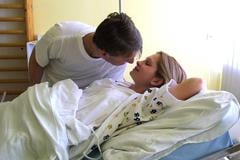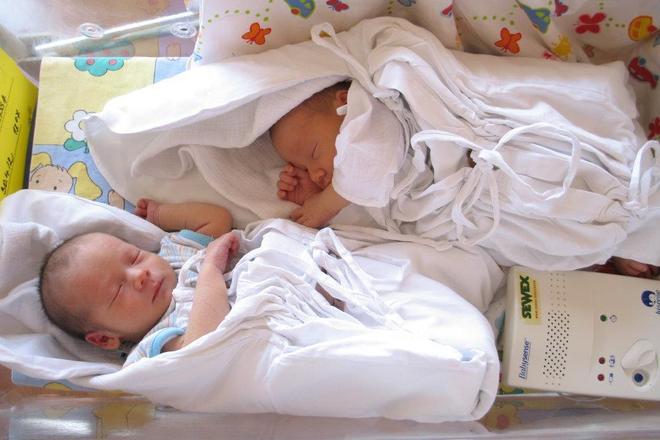No matter what country, the birth experience is highly dependent on individual hospital staff, their characters and attitudes. I had friendly doctors both in Canada and Trnava. My last birth in Slovakia was three years ago, and apparently things have improved since then in Trnava. There are, however, some overarching themes that differentiate Slovakia from other Western countries.
A question of attitude
The most important deficiency in Slovak hospitals is not a matter of money, equipment, or expertise, but of attitude.
With my first child, in Canada, I had admittedly an excellent doctor. “Look,” he said to my husband and I, “if birth is done to you, we did something wrong.”
The birth, I felt, was a cooperation between us. For example, when I wasn’t progressing fast enough, he recommended a course of action, told me what it was and why he suggested it. I had wanted a birth without drugs and said I would rather not use them. He agreed to wait a few hours and then revisit the issue. When we talked about it again, I agreed to his suggestion.
The point is not whether or not I had my way, but that I felt that I had a role in the decision making. I had my ideals and physical symptoms, he made recommendations based on knowledge and experience, and we found a path together for a safe and beautiful birth.
In Slovakia, on the other hand, the attitude can best be described by one nurse. With my second child, when I requested that an unnecessary procedure be delayed, the nurse snapped, “Since when does the patient tell the doctor what to do?”
(The procedure in question was a drug containing oxytocin, which makes contractions stronger to speed up delivery. This is given to everybody and I was told beforehand I could not opt out altogether, although it could be done after the baby was born, to speed the delivery of the placenta. I had been in the hospital all of ten minutes before giving birth and ended up laying on the delivery table for eight hours, so the hurry was purely for convenience.)
Practitioners in Slovakia feel that they are the professionals, with knowledge and experience, and that therefore they know best. Sometimes what they ‘know best’, however, directly contradicts new research and current practice in Western countries, like the position for delivery.
On my third time labouring, again in Trnava, I did not want to lay on my back with feet tied in stirrups and requested the new table, which they have. I instinctively felt what research has shown, that this is not an optimal position for giving birth. “No, no,” said the doctor and nurses, “this is the best way. Trust us, the old table always works the best.” They dismissed my request as unimportant because to them, it is part of a new fad. My request was unsubstantial because I may have read it on the internet, because I do not have a medical degree.
Well, the old table may work best based on the options they had in the last 50 years, but I don’t feel like they gave a fair trial to new methods. I can say with 100-percent surety, based on experiencing three births in three different positions, that I will never ever put my feet in stirrups again. Ever.
There was, fortunately, an improvement in attitudes of the nurses in charge of babies after birth in four years. Perhaps I happened upon a bad shift, but after my second child I swore I would not go back to Trnava, in part because of some Very Grumpy Nurses. I returned, however, the third time around, when I found out that I was expecting twins. As Slovakia has one of the highest rates of increasing c-sections in Europe at 30 percent, I was afraid that I would be forced to have a cesarean. A friend is a doctor in Trnava, and she agreed to let me try a vaginal birth though I could tell the idea made her a little nervous.

Incidentally, birthing twins naturally in Trnava was rare enough that a plethora of people came to watch the birth. I was distinctly annoyed at so many people being present, I was not a show to watch, but didn’t have the energy to start fighting.
The attitude of the doctors and nurses is precisely why a woman would want a doula, someone to advocate for her while she focuses her energy on labouring. While it is indeed an improvement that a woman can now bring in one person to delivery, I would argue that another person should be allowed, precisely because of the attitude of the hospital staff.
Alarmist about germs?
Once a baby is born in Trnava, he or she is fairly quickly whisked off to the postpartum floor. With my second child, because they had to wait for beds to empty, I lay for eight hours on the delivery table. I was handed a drink (that I had brought) when I requested it, but not food. And not, most importantly, my baby. All I wanted was to be with her, but was refused a number of requests. The reason? Once a baby goes to the postpartum floor, they can’t come out because of germs. Considering that I was where babies first come into contact with the world, I would hope that there would be no cause for alarm.
Because of lack of beds my sister-in-law had to sleep on another floor for a number of days, the risky pregnancy floor, but again her child was not allowed off the baby floor. She came down every few hours to nurse, and then leave again.
While I’m sure the policy was made with safety of infants at heart, as research shows that the immune system is strengthened by skin-to-skin contact and breastmilk, practices not commonplace when that policy was made (and even not so much now). Both mothers and babies could be under less stress if they could be together no matter what floor.
In Canada I gave birth in a small hospital that didn’t have a separate maternity ward. All the babies are born in a wing of the hospital with patients of all kinds. No one, that I know of, has been adversely affected.
After the birth
One advantage Slovakia has over Canada is the length of time spent in hospital afterward. In Canada, new mothers are sent home after a day and nurses complain that some mothers are not yet prepared enough to go home. Slovakia has the opportunity to make sure that mothers are well on their way to nursing, but in Trnava the quality of care left me wanting to go home long before my five days were up.
I did feel a difference in the intervening four years between births. With my second child, I never felt comfortable if my way differed from standard practice. If I had the baby by my side, they insisted it be in the bassinet. If I unwrapped them from the cover babies are kept in, I was told to wrap them back up, despite the stifling summer heat. With the twins, I felt like the nurses were more used to mom trying different things, even if they may have interiorly rolled their eyes.
What did not improve was breastfeeding support. Three years ago, every mother I saw had a bottle. Yes, bottlefeeding has it’s place, but if every mother is using it, it is being overused. The nurses would simply ask if I had enough milk, instead of seeing if the baby was getting milk when nursing (this is possible by watching their movements as they nurse). A first time mom especially has no idea and is prone to worrying - she often doesn’t know whether she has enough milk and if she doesn’t, what to do about it..
With the twins, I was regarded as being an idealist for wanting to breastfeed. Just as not one pregnant twin mother that I talked to even realized that a natural birth was an option, so breastfeeding twins is regarded as impossible. When I was having trouble nursing, I was not given any help, just told I had to bottlefeed. When, as a sleep deprived, fluctuating hormonal, emotional mess I called in a lactation consultant, she was regarded with enmity and I offended the most friendly nurse.
The lactation consultant watched, encouraged, reminded me what to look for, recommended some supplements, and gave me some lactation aids (little tubes to supplement with formula without using a bottle). I asked a nurse and the hospital actually had some, but it was never offered. After a few days, I was able to exclusively nurse the twins, thanks to the lactation consultant, and no thanks to the nurses.
A smile makes everyone feel better
Slovaks, in general, are quite reserved towards strangers, as I’ve written about before. If one is buying food or clothes, this kind of customer service is acceptable as a cultural norm, although, ironically, Slovaks don’t seem used to it themselves. In a hospital, however, patients are particularly vulnerable. New moms are physically taxed, emotionally unstable, and trying to figure out how to adjust to caring for this little person. For healthcare professionals, it’s all in a day’s work; they see babies being born every day. For each mother, however, giving birth is A Major Event. Consideration for different ways of doing things, either before, during, or after delivery, will make a woman more comfortable to trust her instincts and help to make the birthing process one of beauty, to be considered for the miracle that is it. A smile and a little empathy makes everyone feel better.
Naomi blogs about the culture, food, and life in Slovakia at Almost Bananas.



 Welcome Jakub and Sofia (probably). (source: Naomi Hužovičová)
Welcome Jakub and Sofia (probably). (source: Naomi Hužovičová)